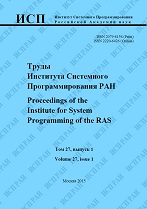|
This article is cited in 1 scientific paper (total in 1 paper)
Graph learning by a set of automata. The nondeterministic case
Igor Burdonov, Alexander Kosachev
Institute for System Programming of the Russian Academy of Sciences
Abstract:
Graph learning with automata is a basic task in many applications. Among such applications is formal model-based verification and testing of software and hardware systems, as well as network exploration including Internet and GRID. The model of a system or a network, in the final analysis, is reduced to an oriented graph of transitions with properties to be examined. In the recent years, the size of the real-life systems and networks and, consequently, the size of their graph models continuously grows. The problems arise when the graph learning by a single automaton (computer) either requires unacceptable long time, or the graph does not fit in the single computer memory, or both. Therefore, there is a task of parallel and distributed graph learning. This task is formalized as graph learning by a set of automata. The basis for such learning is graph traversal (traversing all its arcs accessible from the initial node). Automata can be generated in the initial node, move along the arcs of the graph according with their orientation and exchange messages through independent (of the graph) communication network. The total memory of the automata is used for storing the descriptions of the already traversed part of the graph. To move from node along an arc outgoing from it, the automaton should somehow identify this arc: indicate its number. In our paper "Graph learning by a set of automata" we proposed an algorithm of such traversal for deterministic graphs. The task is more complicated if the graph is nondeterministic. In such graph, to one arc number correspond, generally speaking, multiple arcs, one of which is chosen nondeterministically for traversal. To make the traversal possible, the following should be guaranteed: in unlimited number of experiments, each outgoing arc with the given number can be traversed. We call such nondeterminism fair. This paper covers the solution of the problem of traversal of fairly nondeterministic graphs.
Keywords:
nondeterministic graphs, graph learning, graph traversal, communicating automata, parallel processing, distributed systems, testing.
Citation:
Igor Burdonov, Alexander Kosachev, “Graph learning by a set of automata. The nondeterministic case”, Proceedings of ISP RAS, 27:1 (2015), 51–68
Linking options:
https://www.mathnet.ru/eng/tisp113 https://www.mathnet.ru/eng/tisp/v27/i1/p51
|

|




 Contact us:
Contact us: Terms of Use
Terms of Use
 Registration to the website
Registration to the website Logotypes
Logotypes








 Citation in format
Citation in format 
